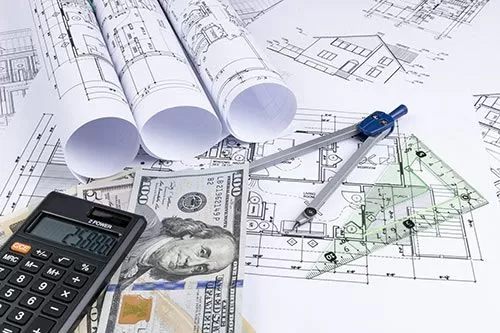
How much do you charge per square foot for a new home?
One of the questions we get asked often at home and garden shows is: How much do you charge per square foot? Simple question. You would think there is a simple answer. This belies a lack of understanding about the different types of new homes and different types of builders. The most common new home builders are known as production or tract builders. They build new homes from a selection of their floor plans, building the same home over and over, on similar sized lots (generally 5,000-6,000 square feet) that they buy from a developer. The house and property are both bought from the builder. As a result, it is fairly easy to compare homes on a cost-per-square-foot basis. Less common are custom homes, where a new home is built on your property, with a floor plan designed just for you. The costs per square foot vary widely in this type of construction, as it is “customized” just for you. Not only is the plan customized, but the finishing materials are your choice, and the costs vary widely. Land costs vary widely as well. Bottom line: Expect to pay some more per square foot for a custom home than for a production home. Construction costs are also affected by the area where you want to build. BGCH offers a free cost estimate. Contact us for more information on current building costs for your area in Central Texas.
What if I have a foreclosure or bankruptcy?
You may still qualify for a new home construction loan, even though you have been through a foreclosure, repossession, or bankruptcy. We live in a country that believes in second chances. Generally one must wait 2-4 years after the discharge or dismissal (not start) of a bankruptcy before it does not count against you. During that time you will probably need to rebuild your credit. At a minimum, you will need 4 “lines” of good credit, such as a car loan, student loan, rent payment, or credit card. Contact us for a veteran lender who can, at no charge, advise you on a strategy to recover from foreclosure, repossession, or bankruptcy. One extra clue: Never be more than 30 days late on a mortgage payment. Most lenders require that all rent or mortgage payments be paid on time for the previous 12 months before a new loan can be approved.
Will a lender checking my credit cause problems in qualifying for a loan?
Generally no. Most borrowers are allowed 3 credit checks per year with no penalty. What does hurt is abuse of credit, where lender after lender after lender checks your credit. Other things that affect your credit score are payments more than 30 days late, bankruptcies, foreclosure, repossession and having a balance of more than 50% of the credit line on a credit card. For more information on maintaining good credit scores, check out https://www.myfico.com/credit-education/improve-your-credit-score
What if I don’t need the loan to build the house, but want a mortgage?
Under Texas law, the only way to qualify for a “mortgage” on your newly built custom home is to obtain a home construction loan before you begin construction. The construction loan is then paid off with the mortgage when construction is finished. In Texas, if you do not get a construction loan, when you are finished you can only qualify for a “home equity” loan, which has higher interest rates than a mortgage. One client wanted to use his cash to build, but get a “mortgage” when finished. He signed for a construction loan, but did not take any draws against the construction loan until construction was finished. He took one draw for the entire construction loan a few days before he signed for his mortgage. This saved him from paying the interim interest on the construction loan, yet he qualified for a mortgage with lower interest rates. A home equity loan may be deductible as a mortgage. Check this out.
Can I do some of the work myself, and still get a mortgage?
The owner builder model for new home construction is focused on managing the project, rather than doing the physical work yourself. However, some clients do 1 or more phases of the work. Common tasks include painting, stained concrete floors, tile work, and cleaning. Several clients have found that, while they are capable of doing the work, they are not as fast as professional contractors. If you can work your regular job and make extra money, you may find that you are dollars ahead, rather than attempting to do some of the construction yourself. One client, an electrical engineer, decided to do all the electrical wiring in his home. He was busy with his job, and could only work weekends on his home, so it took months to get all the wiring the way he wanted it. This resulted in his spending thousands in interest on his construction loan, resulting in no savings over having an electrical contractor do the job. So yes, you can do some of the construction yourself. Just make a wise decision.
